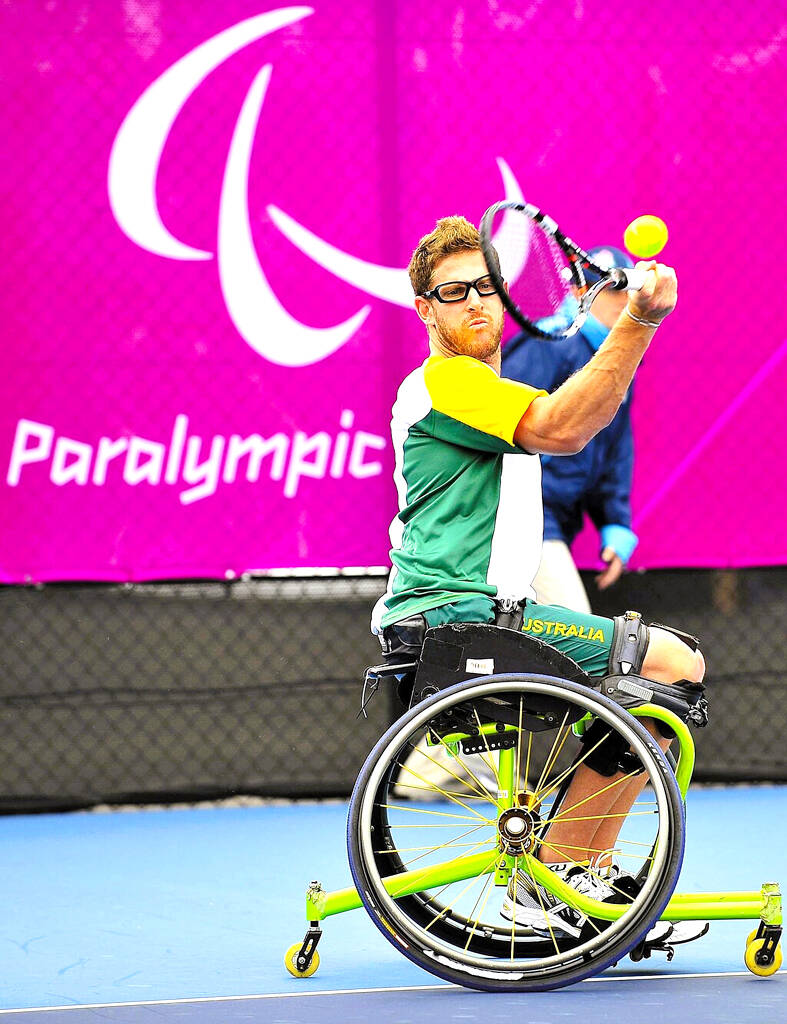對話 Dialogue
清清:奧運會才剛閉幕,緊接著帕運就要登場了,真是運動迷的福音!
Qīngqing: Àoyùnhuì cái gāng bìmù, jǐnjiēzhe Pàyùn jiùyào dēngchǎngle, zhēnshì yùndòng mí de fúyīn!

Photo courtesy of Wikimedia commons 照片:Wikimedia commons 提供
華華:你說的帕運,是不是殘障奧運啊?
Huáhua: Nǐ shuō de Pàyùn, shì búshì Cánzhàng Àoyùn a?
清清:是的,我個人覺得,那些運動員身體雖然都有不方便的地方,但運動精神和能力都值得我們敬佩學習,所以比較喜歡用翻譯帕拉林匹克的名字,來叫它帕運。
Qīngqing: Shìde, wǒ gèrén juéde, nàxiē yùndòngyuán shēntǐ suīrán dōu yǒu bù fāngbiàn de dìfāng, dàn yùndòng jīngshén hé nénglì dōu zhídé wǒmen jìngpèi xuéxí, suǒyǐ bǐjiào xǐhuān yòng fānyì Pàlālínpīkè de míngzì, lái jiào tā Pàyùn.
華華:同意,每次看到那些殘障運動員賣力為國家和自己爭取榮譽的身影,就特別感動,我想我是做不到的。
Huáhua: Tóngyì, měicì kàndào nàxiē cánzhàng yùndòngyuán màilì wèi guójiā hàn zìjǐ zhēngqǔ róngyù de shēnyǐng, jiù tèbié gǎndòng, wǒ xiǎng wǒ shì zuòbúdào de.
清清:這次帕運包括了22個體育項目,一共有185個國家的運動員參賽,肯定也是相當精采!
Qīngqing: Zhècì Pàyùn bāokuòle èrshí'èr ge tǐyù xiàngmù, yígòng yǒu yìbǎi bāshíwǔ ge guójiā de yùndòngyuán cānsài, kěndìng yě shì xiāngdāng jīngcǎi!
華華:開幕式是什麼時候啊?
Huáhua: Kāimùshì shì shénme shíhòu a?
清清:台灣時間是8月29號凌晨1點半,在巴黎的協和廣場舉行,這是帕運會歷史上第一次在戶外場地辦開幕式喔!
Qīngqing: Táiwān shíjiān shì qī yuè èrshíqī hào língchén yì diǎn bàn, zài Bālí de Xiéhé Guǎngchǎng jǔxíng, zhè shì Pàyùnhuì lìshǐ shàng dì yī cì zài hùwài chǎngdì bàn kāimùshì o!
華華:我絕對不會錯過!準備好炸雞跟珍奶,熬夜看轉播也是幸福的!
Huáhua: Wǒ juéduì búhuì cuòguò! Zhǔnbèi hǎo zhájī gēn zhēnnǎi, áoyè kàn zhuǎnbò yěshì xìngfú de!
翻譯 Translation
Qingqing: The Olympics just concluded, and now the Paralympics are about to start. It’s a great time for sports fans!
Huahua: When you say the Paralympics, do you mean the games for athletes with disabilities?
Qingqing: Yes, I personally feel that although these athletes have physical limitations, their sportsmanship and abilities are truly admirable and something we can all learn from. That’s why I prefer to call it the Paralympics.
Huahua: I agree. Every time I see those athletes striving to earn honor for their country and themselves, I am deeply moved. I don’t think I could do that.
Qingqing: This time round, the Paralympics will include 22 sports, with athletes from 185 countries participating. It’s going to be quite exciting!
Huahua: When is the opening ceremony?
Qingqing: It will be at 1:30am Taiwan time on Aug. 29, held at the Place de la Concorde in Paris. This is the first time in Paralympic history that the opening ceremony will be held in an outdoor venue.
Huahua: I wouldn’t miss this for the world. I’ll get ready with fried chicken and bubble tea. Staying up late to watch the broadcast is going to be a real treat!
生詞 Vocabulary
1. 帕運 (Pàyùn) Paralympics
2. 閉幕 (bìmù) closing, closure
3. 福音 (fúyīn) good news
4. 殘障 (cánzhàng) disability, impairment
5. 運動員 (yùndòngyuán) athlete
6. 賣力 (màilì) put in a lot of effort, working hard
7. 榮譽 (róngyù) honor
8. 凌晨 (língchén) early morning
教材音檔 Audio Files
國立清華大學華語中心提供
By National Tsing Hua University Chinese Language Center:

A: When is the Lantern Festival? B: The festival is celebrated on the 15th day of the first month of the lunar calendar, which fell on Feb. 12 this year. A: Oh no! Did I miss the 2025 Taipei Lantern Festival? B: Yes, you did. But you can still go to the 2025 Taiwan Lantern Festival in Taoyuan, which will run until this Sunday. A: Let’s go admire the exuberant lanterns. A: 元宵節到底是哪一天? B: 就是農曆1月15日啊,今年則落在國曆2月12日。 A: 喔不,我是不是錯過了2025台北燈節? B: 是的,但你還可以去桃園的2025台灣燈會,活動將持續至週日。 A: 那我們去欣賞豐富的花燈秀吧! (By Eddy Chang, Taipei Times/台北時報張聖恩)

Every February, the small town of Ptuj in Slovenia comes alive with the vibrant celebration of its famous carnival. This festival, with its deep historical roots, is a cherished tradition where local residents come together to ward off the winter cold and embrace the arrival of spring. Participants dress up in furry costumes, transforming into kurenti, mythical monsters believed to drive away evil spirits and bring good fortune for the new year. Although the exact origins of the Ptuj carnival remain a mystery, it is firmly rooted in ancient Slavic and Illyrian cultures. The modern form of the carnival

A: What’s the theme of the 2025 Taiwan Lantern Festival’s main lantern? B: The theme is “Paradise,” and the main lantern is a snake-shaped “infinity” symbol that features a lighting show every half an hour. A: Cool, I heard that there are over 300 lanterns. B: There are even giant lanterns in the shape of Pikachu and some other popular Pokemon characters. A: Let’s go now. A: 2025台灣燈會主燈的主題是什麼? B: 主題是「無限樂園」!主燈的造型則是蛇形的數學「無限號」,主燈每半小時還有一次燈光秀。 A: 酷喔,聽說總共有300多件花燈作品。 B: 甚至還有皮卡丘和其他熱門寶可夢角色的巨型花燈呢。 A: 哇我們現在就出發吧! (By Eddy Chang, Taipei Times/台北時報張聖恩)

本文由生成式AI協作,本刊編輯編修。 Tucked away in southwestern Taiwan, Yunlin County is a treasure trove of cultural heritage, rich history, and natural beauty. From its stunning temples and glove puppetry to historical architecture and picturesque landscapes, Yunlin rewards those who venture off the beaten path. Yunlin is renowned for its flourishing temple culture. Temples in this region are not merely places of worship but also communal centers where people gather for festivals, rituals, and social functions. One of the most notable temples here is the Beigang Chaotian Temple, which was built more than 300 years ago and is dedicated to Matsu, the sea